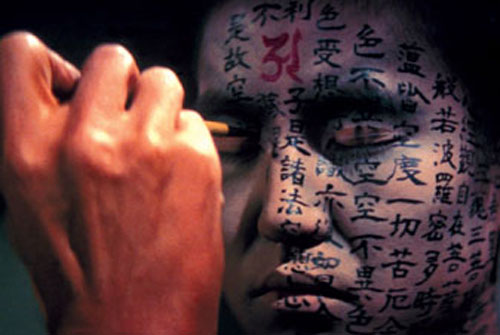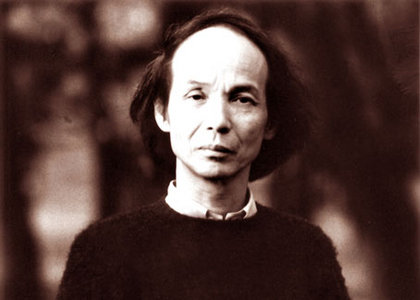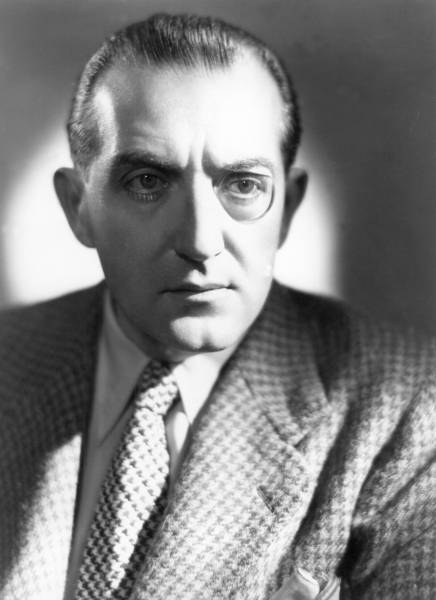
The Hollywood career of Fritz Lang will be celebrated with two-week series at Film Forum (photo courtesy Photofest)
Film Forum
209 West Houston St.
January 28 – February 10
212-727-8110
www.filmforum.org
Following a spectacular career in Germany that included such masterful films as DR. MABUSE, THE GAMBLER (1922), DIE NIBELUNGEN (1924), METROPOLIS (1927), and M (1931), Viennese director Friedrich Christian Anton “Fritz” Lang was beckoned to Hollywood, where he continued making high-quality works, primarily in the noir crime genre. Film Forum will be honoring his impressive transition to American cinema with a two-week, twenty-two-film retrospective of his complete Hollywood canon, featuring many of the silver screen’s greatest, from Spencer Tracy, Broderick Crawford, and Lee Marvin to Sylvia Sidney, Rhonda Fleming, and Marilyn Monroe, as well as Gary Cooper, Marlene Dietrich, Henry Fonda, Barbara Stanwyck, Ray Milland, George Sanders, and Anne Baxter. The series begins January 28-29 with a double feature of THE BIG HEAT (1953) and HUMAN DESIRE (1954), both starring Glenn Ford and Gloria Grahame, and includes such other great twin bills as THE WOMAN IN THE WINDOW (1944) and SCARLET STREET (1945) on January 30, MINISTRY OF FEAR (1944) and MAN HUNT (1941) on February 4-5, and CLASH BY NIGHT (1952) and RANCHO NOTORIOUS (1952) on February 6-7.
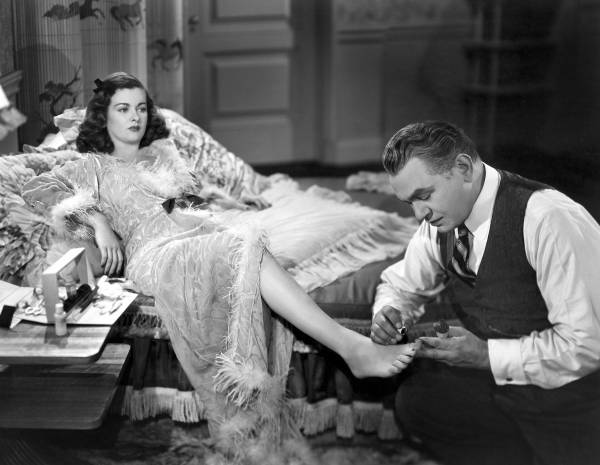
Femme fatale Joan Bennett gets her claws into meek amateur painter Edward G. Robinson in Fritz Lang’s psychological film noir SCARLET STREET (courtesy Photofest)
SCARLET STREET (Fritz Lang, 1945)
Sunday, January 30, 3:25, 7:20
 Director Fritz Lang and screenwriter Dudley Nichols’s adaptation of Jean Renoir’s 1931 LA CHIENNE, based on the novel by Georges de La Fouchardière, is a transplanted German street film moved to New York City. Edward G. Robinson stars as Christopher Cross, one of the all-time-great saps in the history of cinema. A henpecked cashier at a large clothing store where he has just been given his twenty-five-year gold watch, Cross instantly falls in love with a floozy he meets on a rainy night, Kitty March (Joan Bennett), who is soon conspiring with her sleazy boyfriend, Johnny (Dan Duryea), to bilk Cross, thinking that he is a wealthy painter whose canvases go for upwards of fifty grand apiece. Meanwhile, Cross continues to think that Kitty is a good girl who will marry him if he were free. But as Chris’s suspicions about Johnny grow, so does the tension, leading to a classic noir finale. Filmed on Hollywood sets designed to resemble Greenwich Village and Brooklyn, SCARLET STREET is a dark, somber psychological thriller built around a mark and a femme fatale, reminiscent of Josef von Sternberg’s 1930 tale THE BLUE ANGEL, in which Emil Jannings is willing to sacrifice everything for Marlene Dietrich. Robinson, so good at playing tough gangsters, shows a surprisingly vulnerable, tender side as Cross, who refuses to see the truth staring him in the face, just as his paintings lack proper perspective. Duryea has a field day as Johnny, while Bennett is appropriately shady as the deceitful moll. SCARLET STREET is screening at Film Forum on January 30 as part of a double feature with Lang’s THE WOMAN IN THE WINDOW, which also involves Robinson, Bennett, and Duryea caught up in a sordid story of art, blackmail, and other grim pursuits.
Director Fritz Lang and screenwriter Dudley Nichols’s adaptation of Jean Renoir’s 1931 LA CHIENNE, based on the novel by Georges de La Fouchardière, is a transplanted German street film moved to New York City. Edward G. Robinson stars as Christopher Cross, one of the all-time-great saps in the history of cinema. A henpecked cashier at a large clothing store where he has just been given his twenty-five-year gold watch, Cross instantly falls in love with a floozy he meets on a rainy night, Kitty March (Joan Bennett), who is soon conspiring with her sleazy boyfriend, Johnny (Dan Duryea), to bilk Cross, thinking that he is a wealthy painter whose canvases go for upwards of fifty grand apiece. Meanwhile, Cross continues to think that Kitty is a good girl who will marry him if he were free. But as Chris’s suspicions about Johnny grow, so does the tension, leading to a classic noir finale. Filmed on Hollywood sets designed to resemble Greenwich Village and Brooklyn, SCARLET STREET is a dark, somber psychological thriller built around a mark and a femme fatale, reminiscent of Josef von Sternberg’s 1930 tale THE BLUE ANGEL, in which Emil Jannings is willing to sacrifice everything for Marlene Dietrich. Robinson, so good at playing tough gangsters, shows a surprisingly vulnerable, tender side as Cross, who refuses to see the truth staring him in the face, just as his paintings lack proper perspective. Duryea has a field day as Johnny, while Bennett is appropriately shady as the deceitful moll. SCARLET STREET is screening at Film Forum on January 30 as part of a double feature with Lang’s THE WOMAN IN THE WINDOW, which also involves Robinson, Bennett, and Duryea caught up in a sordid story of art, blackmail, and other grim pursuits.
 When media magnate Amos Kynes (Robert Warwick) dies, his son Walter (Vincent Price) takes over despite Amos’s greatest fears. Walter decides that whoever gets a scoop on the Lipstick Killer will become his number two man, so the backstabbing race is on among sleazy wire service chief Mark Loving (George Sanders); managing editor Jon Day Griffith (Thomas Mitchell), who’ll do just about anything for a story; and Harry Kritzer (James Craig), who thinks the best way to get the job is from the bed of Walter’s wife (Rhonda Fleming). Throw in cynical television journalist Ed Mobley (Dana Andrews) and hot-to-trot columnist Mildred Donner (Ida Lupino) and you have another one of Hollywood’s terrific newspaper pics. Director Fritz Lang pulls no punches; the film is filled with plenty of sexual undertones (and overtones), and Kynes himself is a take-off of Charles Foster Kane, the glistening K atop his New York City skyscraper reminiscent of the K atop Xanadu’s front gate. WHILE THE CITY SLEEPS is screening with Lang’s 1948 murder mystery SECRET BEYOND THE DOOR, starring Joan Bennett and Michael Redgrave, as part of Film Forum’s Fritz Lang in Hollywood series, which continues through February 10 with such other great twin bills as MINISTRY OF FEAR (1944) and MAN HUNT (1941) on February 4-5, CLASH BY NIGHT (1952) and RANCHO NOTORIOUS (1952) on February 6-7, and YOU ONLY LIVE ONCE (1937) and YOU AND ME (1938) on February 9-10.
When media magnate Amos Kynes (Robert Warwick) dies, his son Walter (Vincent Price) takes over despite Amos’s greatest fears. Walter decides that whoever gets a scoop on the Lipstick Killer will become his number two man, so the backstabbing race is on among sleazy wire service chief Mark Loving (George Sanders); managing editor Jon Day Griffith (Thomas Mitchell), who’ll do just about anything for a story; and Harry Kritzer (James Craig), who thinks the best way to get the job is from the bed of Walter’s wife (Rhonda Fleming). Throw in cynical television journalist Ed Mobley (Dana Andrews) and hot-to-trot columnist Mildred Donner (Ida Lupino) and you have another one of Hollywood’s terrific newspaper pics. Director Fritz Lang pulls no punches; the film is filled with plenty of sexual undertones (and overtones), and Kynes himself is a take-off of Charles Foster Kane, the glistening K atop his New York City skyscraper reminiscent of the K atop Xanadu’s front gate. WHILE THE CITY SLEEPS is screening with Lang’s 1948 murder mystery SECRET BEYOND THE DOOR, starring Joan Bennett and Michael Redgrave, as part of Film Forum’s Fritz Lang in Hollywood series, which continues through February 10 with such other great twin bills as MINISTRY OF FEAR (1944) and MAN HUNT (1941) on February 4-5, CLASH BY NIGHT (1952) and RANCHO NOTORIOUS (1952) on February 6-7, and YOU ONLY LIVE ONCE (1937) and YOU AND ME (1938) on February 9-10.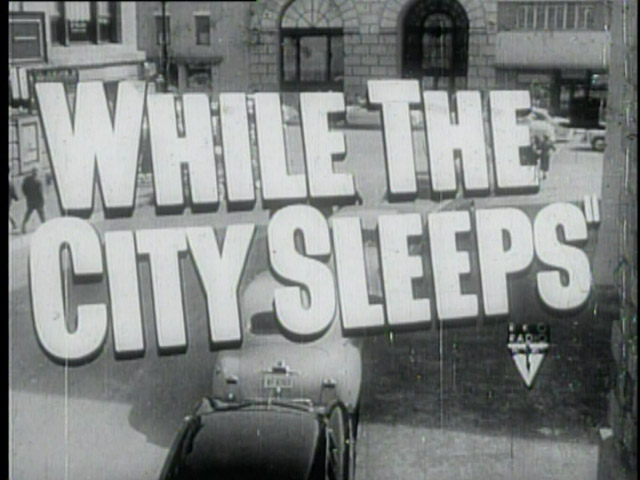


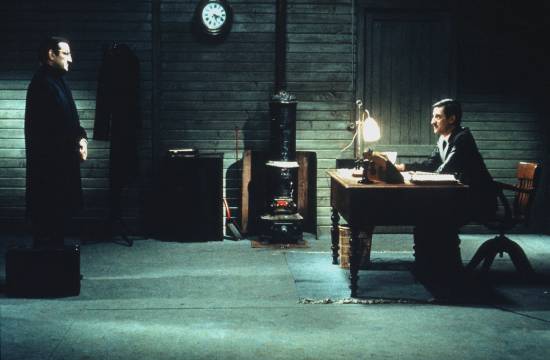
 Based on the novel by Joseph Kessel (BELLE DE JOUR), Jean-Pierre Melville’s 1969 WWII drama ARMY OF SHADOWS got its first theatrical release in America a few years ago, in a restored 35mm print supervised by the film’s cinematographer, Pierre Lhomme, who shot it in a beautiful blue-gray palette. The film centers on a small group of French resistance fighters, including shadowy leader Luc Jardie (Paul Meurisse), the smart and determined Mathilde (Simone Signoret), the nervous Jean-François (Jean-Pierre Cassel), the steady and dependable Felix (Paul Crauchet), the stocky Le Bison (Christian Barbier), the well-named Le Masque (Claude Mann), and the unflappable and practical Gerbier (Lino Ventura). Although Melville, who was a resistance fighter as well, wants the film to be his personal masterpiece, he is too close to the material, leaving large gaps in the narrative and giving too much time to scenes that don’t deserve them. He took offense at the idea that he portrayed the group of fighters as gangsters, yet what shows up on the screen is often more film noir than war movie. However, there are some glorious sections of ARMY OF SHADOWS, including Gerbier’s escape from a Vichy camp, the execution of a traitor to the cause, and a tense MISSION: IMPOSSIBLE–like (the TV series, not the Tom Cruise vehicles) attempt to free the imprisoned Felix. But most of all there is Ventura, who gives an amazingly subtle performance that makes the overly long film (nearly two and a half hours) worth seeing all by itself. ARMY OF SHADOWS is back at Film Forum for a special one-week return engagement December 29 – January 4.
Based on the novel by Joseph Kessel (BELLE DE JOUR), Jean-Pierre Melville’s 1969 WWII drama ARMY OF SHADOWS got its first theatrical release in America a few years ago, in a restored 35mm print supervised by the film’s cinematographer, Pierre Lhomme, who shot it in a beautiful blue-gray palette. The film centers on a small group of French resistance fighters, including shadowy leader Luc Jardie (Paul Meurisse), the smart and determined Mathilde (Simone Signoret), the nervous Jean-François (Jean-Pierre Cassel), the steady and dependable Felix (Paul Crauchet), the stocky Le Bison (Christian Barbier), the well-named Le Masque (Claude Mann), and the unflappable and practical Gerbier (Lino Ventura). Although Melville, who was a resistance fighter as well, wants the film to be his personal masterpiece, he is too close to the material, leaving large gaps in the narrative and giving too much time to scenes that don’t deserve them. He took offense at the idea that he portrayed the group of fighters as gangsters, yet what shows up on the screen is often more film noir than war movie. However, there are some glorious sections of ARMY OF SHADOWS, including Gerbier’s escape from a Vichy camp, the execution of a traitor to the cause, and a tense MISSION: IMPOSSIBLE–like (the TV series, not the Tom Cruise vehicles) attempt to free the imprisoned Felix. But most of all there is Ventura, who gives an amazingly subtle performance that makes the overly long film (nearly two and a half hours) worth seeing all by itself. ARMY OF SHADOWS is back at Film Forum for a special one-week return engagement December 29 – January 4.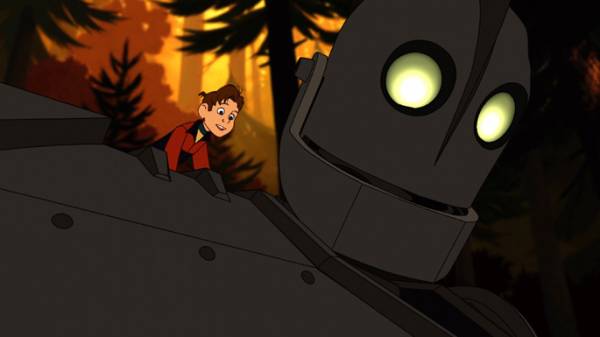
 Writer-director Brad Bird won Oscars for his animated features THE INCREDIBLES (2004) and RATATOUILLE (2007), but the Simpsons veteran first made his mark with the charming 1999 sci-fi cartoon THE IRON GIANT, being revived at Film Forum during this holiday week. Based on the 1968 book THE IRON MAN by Ted Hughes, the animated film is set during the Cold War, with the general populace and the military fearful of a nuclear attack by the Soviet Union. So when rumors that a fifty-foot-tall iron giant (voiced by Vin Diesel) has fallen from the sky, the government wants to destroy it, but it is being hidden by young Hogarth Hughes (Eli Marienthal), who has saved its life. Hogarth keeps his new best friend a secret from his mother (Jennifer Aniston) and federal agent Kent Mansley (Christopher McDonald) with the help of the town beatnik, Dean McCoppin (Harry Connick Jr.), who takes a liking to Hogarth’s mom. The screenplay, written by Tim McCanlies (SECONDHAND LIONS), plays with various genre clichés just enough to avoid being clichéd itself, instead making THE IRON GIANT a delightful, nearly flawless twist on the E.T. mythos, mixed in with a little Androcles & the Lion, THE DAY THE EARTH STOOD STILL, and even FRANKENSTEIN and KING KONG. The film, which also features the voices of Cloris Leachman (Mrs. Tensedge), John Mahoney (General Rogard), and M. Emmet Walsh (Earl Stutz), is a treat for children and adults. Bird, meanwhile, has graduated to live action; his next movie will be MISSION: IMPOSSIBLE — GHOST PROTOCOL, starring Tom Cruise, Jeremy Renner, and Simon Pegg.
Writer-director Brad Bird won Oscars for his animated features THE INCREDIBLES (2004) and RATATOUILLE (2007), but the Simpsons veteran first made his mark with the charming 1999 sci-fi cartoon THE IRON GIANT, being revived at Film Forum during this holiday week. Based on the 1968 book THE IRON MAN by Ted Hughes, the animated film is set during the Cold War, with the general populace and the military fearful of a nuclear attack by the Soviet Union. So when rumors that a fifty-foot-tall iron giant (voiced by Vin Diesel) has fallen from the sky, the government wants to destroy it, but it is being hidden by young Hogarth Hughes (Eli Marienthal), who has saved its life. Hogarth keeps his new best friend a secret from his mother (Jennifer Aniston) and federal agent Kent Mansley (Christopher McDonald) with the help of the town beatnik, Dean McCoppin (Harry Connick Jr.), who takes a liking to Hogarth’s mom. The screenplay, written by Tim McCanlies (SECONDHAND LIONS), plays with various genre clichés just enough to avoid being clichéd itself, instead making THE IRON GIANT a delightful, nearly flawless twist on the E.T. mythos, mixed in with a little Androcles & the Lion, THE DAY THE EARTH STOOD STILL, and even FRANKENSTEIN and KING KONG. The film, which also features the voices of Cloris Leachman (Mrs. Tensedge), John Mahoney (General Rogard), and M. Emmet Walsh (Earl Stutz), is a treat for children and adults. Bird, meanwhile, has graduated to live action; his next movie will be MISSION: IMPOSSIBLE — GHOST PROTOCOL, starring Tom Cruise, Jeremy Renner, and Simon Pegg.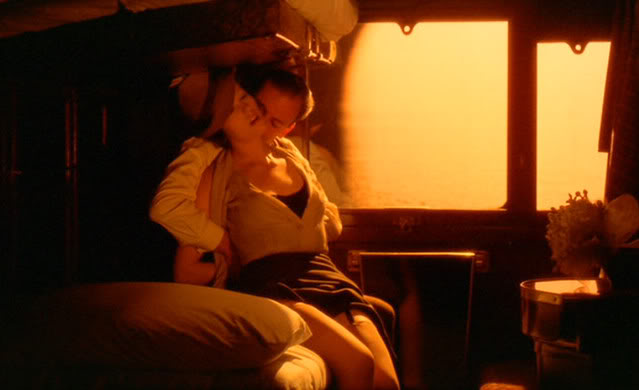
 Based on the novel by Alberto Moravia, Bernardo Bertolucci’s gorgeous masterpiece, THE CONFORMIST, is a political thriller about paranoia, pedophilia, and trying to find one’s place in a changing world. Jean-Louis Trintignant (AND GOD CREATED WOMAN, Z, MY NIGHT AT MAUD’S) stars as Marcello Clerici, a troubled man who suffered childhood traumas and is now attempting to join the fascist secret police. To prove his dedication to the movement, he is ordered to assassinate one of his former professors, the radical Luca Quadri (Enzo Tarascio), who is living in France. He falls for Quadri’s much younger wife, Anna (Dominique Sanda), who takes an intriguing liking to Clerici’s wife, Giulia (Stefania Sandrelli), while Manganiello (Gastone Moschin) keeps a close watch on him, making sure he will carry out his assignment. THE CONFORMIST, made just after THE SPIDER’S STRATAGEM and followed by LAST TANGO IN PARIS, captures one man’s desperate need to belong, to become a part of Mussolini’s fascist society and feel normal at the expense of his real inner feelings and beliefs. An atheist, he goes to church to confess because Giulia demands it. A bureaucrat, he is not a cold-blooded killer, but he will murder a part of his past in order to be accepted by the fascists (as well as Bertolucci’s own past, as he makes a sly reference to his former mentor, Jean-Luc Godard, by using the French auteur’s phone number and address for Quadri’s). Production designer Ferdinando Scarfiotti and cinematographer Vittorio Storaro bathe the film in lush Art Deco colors as Bertolucci moves the story, told in flashbacks, through a series of set pieces that include an erotic dance by Anna and Giulia, a Kafkaesque visit to a government ministry, and a stunning use of black and white and light and shadow as Marcello and Giulia discuss their impending marriage. THE CONFORMIST is a multilayered psychological examination of a complex figure living in complex times, as much about the 1930s as the 1970s, as the youth of the Western world sought personal, political, and sexual freedom. In addition to this one-week presentation of a new 35mm print of THE CONFORMIST at Film Forum,
Based on the novel by Alberto Moravia, Bernardo Bertolucci’s gorgeous masterpiece, THE CONFORMIST, is a political thriller about paranoia, pedophilia, and trying to find one’s place in a changing world. Jean-Louis Trintignant (AND GOD CREATED WOMAN, Z, MY NIGHT AT MAUD’S) stars as Marcello Clerici, a troubled man who suffered childhood traumas and is now attempting to join the fascist secret police. To prove his dedication to the movement, he is ordered to assassinate one of his former professors, the radical Luca Quadri (Enzo Tarascio), who is living in France. He falls for Quadri’s much younger wife, Anna (Dominique Sanda), who takes an intriguing liking to Clerici’s wife, Giulia (Stefania Sandrelli), while Manganiello (Gastone Moschin) keeps a close watch on him, making sure he will carry out his assignment. THE CONFORMIST, made just after THE SPIDER’S STRATAGEM and followed by LAST TANGO IN PARIS, captures one man’s desperate need to belong, to become a part of Mussolini’s fascist society and feel normal at the expense of his real inner feelings and beliefs. An atheist, he goes to church to confess because Giulia demands it. A bureaucrat, he is not a cold-blooded killer, but he will murder a part of his past in order to be accepted by the fascists (as well as Bertolucci’s own past, as he makes a sly reference to his former mentor, Jean-Luc Godard, by using the French auteur’s phone number and address for Quadri’s). Production designer Ferdinando Scarfiotti and cinematographer Vittorio Storaro bathe the film in lush Art Deco colors as Bertolucci moves the story, told in flashbacks, through a series of set pieces that include an erotic dance by Anna and Giulia, a Kafkaesque visit to a government ministry, and a stunning use of black and white and light and shadow as Marcello and Giulia discuss their impending marriage. THE CONFORMIST is a multilayered psychological examination of a complex figure living in complex times, as much about the 1930s as the 1970s, as the youth of the Western world sought personal, political, and sexual freedom. In addition to this one-week presentation of a new 35mm print of THE CONFORMIST at Film Forum, 
